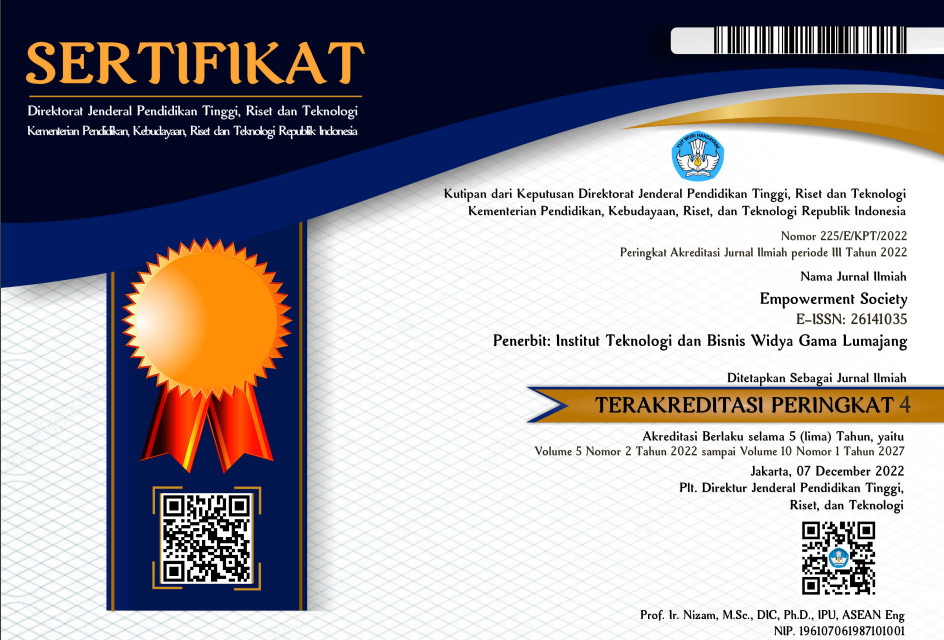Green Entrepreneurship Batik Wijaya, a Strategy to Increase the Income of Pungsari Village Community, Plupuh Subdistrict, Sragen Regency
DOI:
https://doi.org/10.30741/eps.v7i1.1283Keywords:
Batik Wijaya, Green Entrepreneurship, Pungsari, StrategyAbstract
This community service activity was carried out in the Pungsari area, Plupuh District, Sragen Regency, in collaboration with UKM Batik Wijaya and the Sragen Regency Government. The purpose of this activity is to foster green entrepreneurship at a UKM Batik Wijaya so that it can increase the income of the surrounding community while still paying attention to the concept of environmentally sound business sustainability. UKM Batik Wijaya produces batik products that are not inferior when compared to other SMEs. Participation of participants in this activity shows high enthusiasm in an effort to increase creativity and innovation in the production of UKM Wijaya. After the implementation of this activity, it is hoped that it can increase the income of the community, especially those who are members of UKM Wijaya and create a healthier environment in Pungsari Village.
Downloads
References
Asmara, T. T. P., & Murwadji, T. (2020). Juridical Review of the Application of the Quadruplehelix Concept in the Implementation of CSR for MSMEs. Journal of Indonesian Legislation, 17(1), 38-50.
Atlantika, Y. N., Manggu, B., & Magdalena, Y. (2023). Analysis of the Level of Environmental Knowledge, Perception, and Behavior of MSMEs in Border Areas in an Effort to Implement Green Economy. Sebatik, 27(1), 87-96.
Budiarto, R., Putero, S. H., Suyatna, H., Astuti, P., Saptoadi, H., Ridwan, M. M., & Susilo, B. (2018). MSME development between conceptual and practical experience. Ugm Press.
Engkus, E. (2018, November). Optimizing Government-Business Partnership (Gbps) in the Disruptive Era and Digital Governance to Achieve Sustainable National Goals. In Proceeding of the National Seminar on Business, Government, And The Public: Optimizing Government-Business Partnerships (Gbps) in the Disruptive Era and Digital Governance to Realize Sustainable National Goals (Vol. 1, No. 1, pp. 1-20). http://digilib. uinsgd. ac. id.
Irianto, J. (2022). Small and Medium Enterprise Development: Concept Overview of Stakeholder Engagement, Business Coaching, and the ADDIE Model in Training. JKMP (Journal of Public Policy and Management), 10(2), 7-15.
Luaylik, N. F., Azizah, R. N., & Saputri, E. (2022). Empowerment Strategy of Umkm Batik Klampar Village, Pamekasan Regency in the Perspective of Sustainable Policy. Journal of Mediasosian: Journal of Social Science and Public Administration, 6(2), 315-332.
Maulyan, F. F. (2019). The Role of Training to Improve the Quality of Human Resources and Career Development: A Theoretical Review. Journal of Management Science, 1(1), 40-50.
Nugraha, A. R. (2015). Implementation of corporate social responsibility activities "go green economy" based on local wisdom. Journal of Communication, 7(2), 118-128.
Nugraha, R., Varlitya, C. R., Judijanto, L., Adiwijaya, S., Suryahani, I., Murwani, I. A., ... & Basbeth, F. (2024). Green Economy: Theories, Concepts, Ideas for the Future Application of Green Economy in Various Fields. Sonpedia Publishing Indonesia.
Sulaiman, S., Nengsih, T. A., & Agusriandi, A. (2023). Analysis of Innovation Through Technological Progress in Batik Production and Marketing in Danau Teluk District, Jambi City. Scientific Journal of Management, Business and Entrepreneurship, 3(3), 180-200.
Downloads
Published
How to Cite
Issue
Section
License
Copyright (c) 2024 Rahmawati Rahmawati, Endang Dwi Amperawati, Siti Nurlaela, Mahameru Rosy Rochmatullah

This work is licensed under a Creative Commons Attribution-NonCommercial 4.0 International License.










